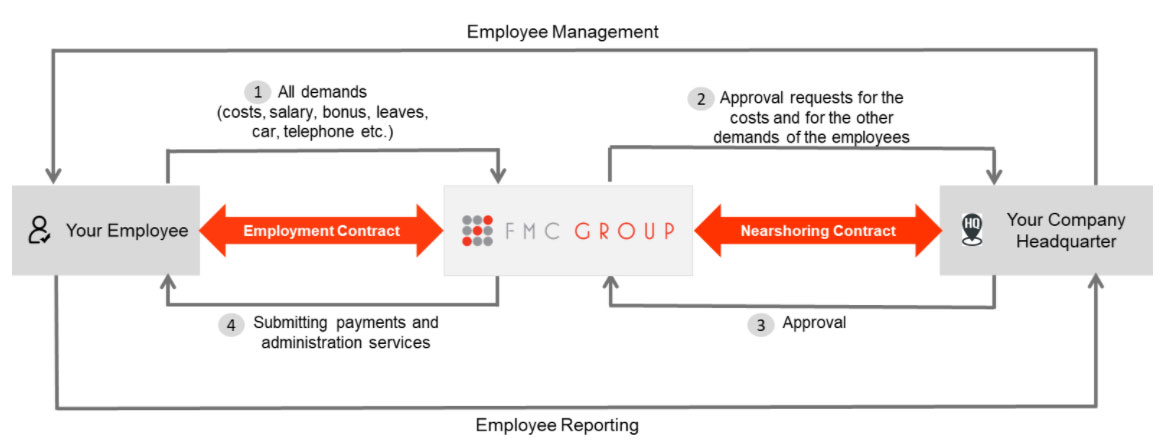
Nearshoring to Portugal
The Portuguese labor force is one of the most proficient in the English language (non-native) worldwide, making it extremely easy to communicate efficiently with Portuguese professionals. In addition to its linguistic proficiency, the Portuguese workforce is highly-skilled and counts hundreds of thousands of university graduates. The quality of its talent pool, along with its relatively low labor costs in comparison to other Western European countries make Portugal the perfect EU destination for nearshoring.
Through its nearshoring services, FMC Group accompanies businesses wishing to hire the best candidates from the Portuguese talent pool and completely manages their recruitment process. Instead of browsing through hundreds of applications, clients will only have to make their choice from a handful of top candidates selected and interviewed by FMC Group. On top of that, clients can manage the functions of their local employees in Portugal and focus on their business decisions without worrying about the administrative and legal sides of their employees’ management.
Content:
- Advantages of Nearshoring to Portugal
- FMC Group’s Nearshoring Approach
- Advantages of Nearshoring with FMC Group
- Labor Laws in Portugal
- Working Hours
- Annual Paid Leave
- Other Types of Paid Leave
- Minimum Wage
- Social Contributions and Taxes

Get in touch with us

Advantages of Nearshoring to Portugal
- Portugal has a highly-skilled, experienced, and motivated workforce. The country is the seventh in the world in terms of English proficiency, according to the 2020 EF English Proficiency Index, allowing for easy communication with Portuguese employees.
- Portugal’s strategic location and its rich multicultural history have allowed the Portuguese population to develop great adaptability and openness to cultural differences. This allows Portuguese employees to quickly integrate with foreign companies and adopt their corporate culture.
- Labor costs in Portugal are some of the lowest in the entire European Union. The average monthly salary of a software engineer in Portugal is EUR 2,600, which is significantly low in comparison to some other European countries, such as Germany (around EUR 3,500 on average).
- The talent pool in Portugal is constantly growing. More than 200,000 students graduate from Portuguese universities every year, notably in the fields of engineering, manufacturing, and business.
FMC Group’s Nearshoring Approach
Selection
- We select the best candidates to join your team, according to your requirements;
- We prepare personalized reports on the best candidates;
- We conduct job interviews;
- We conduct personality tests if needed.
Recruitment
- We show you recorded video interviews and let you make the final hiring decision;
- We conclude employment contracts with the employees you choose and invite them to work at our local offices.
Operation
- We give you complete functional management of the employees;
- We take care of the administrative management of the employees (contracts, payment, etc.);
- We provide your employees with all the necessary infrastructure (office, phone, computer, etc.).

Advantages of Nearshoring with FMC Group
- We look for the best employees that match your requirements and conditions;
- We use the most adequate methods to advertise for the job and research our talent database;
- We help you significantly reduce the financial and time costs related to the recruitment process;
- We give you immediate and easy access to new markets without the need for registering a local company;
- We offer flexible services without the need for long term commitment;
- We give you full control of the functional management of your employees.
Labor Laws in Portugal
Working Hours
- Employees in Portugal can work up to 40 hours per week and 8 hours per day.
- Overtime work is paid at 25% above the regular pay for the first hour and 37.5% above the normal salary for the remaining duration. During holidays and rest days, overtime work is paid at 50% above the regular salary.
- Overtime work cannot exceed 2 hours per day, 8 hours per week, 150 hours per year at companies with over 50 employees, and 175 hours per year at companies with less than 50 employees.
Annual Paid Leave
- Following their first year of work, employees can take 22 days of paid leave every year.
- During their first year of work, employees earn two days of paid leave each month, up to a maximum of 20 days.
Portugal celebrates 13 public holidays.
- January 1st: New Year’s Day
- Between April 2nd and May 6th: Good Friday
- Between April 4th and May 8th: Easter Sunday
- April 25th: Freedom Day
- May 1st: Labor Day
- June 10th: National Day
- Between May 21st and June 24th: Corpus Christi
- August 15th: Assumption of Mary
- October 5th: Republic Day
- November 1st: All Saint’s Day
- December 1st: Restoration of Independence Day
- December 8th: Immaculate Conception
- December 25th: Christmas Day
Other Types of Paid Leave
Maternity Leave: Female employees can take up to 120 days of maternity leave, including 30 days before birth and a mandatory six weeks afterward. Pay during maternity leave is fully covered by social security.
Paternity Leave: New fathers can take 20 days of paid leave within the first six weeks of their child’s birth, including a mandatory five days following delivery. Pay during paternity leave is fully covered by social security.
Parental Leave: After the maternity and paternity leaves are concluded, one of the two parents has the right to extend their leave up to 120 or 150 days. The parental leave is fully paid by social security if its duration is 120 days and paid at 80% of the regular salary if it reaches 150 days.
Sick Leave: Employees are entitled to sick leave for up to three years if their medical condition hinders their ability to work. The sick leave has to be justified by a doctor. The first three days of sick leave have to be paid by the employer at a rate of 89% of the regular pay. Meanwhile, social security covers pay during the remaining duration, at rates of 55% for the first 30 days, 60% between 31 and 90 days, 70% between 91 and 365 days, and 75% after the first year.
Bereavement Leave: Employees are entitled to five consecutive days of paid leave after the death of an immediate family member.
Family Leave: Employees can take up to 30 days of paid leave per year to care for family members under the age of 12 and up to 15 days to care for senior family members.
Marriage Leave: Newly-wed employees can take up to 15 days of paid leave after their wedding.
Minimum Wage
- The minimum wage in Portugal is set at EUR 705 per month on a 14-months calculation, which amounts to EUR 9,870 per year.
- Employers are required to pay their employees 13th and 14th-month bonus salaries in June and December of every year.
- The payroll in Portugal is managed on a monthly basis, with salaries paid on the last working day of each month.
Social Contributions and Taxes
- Employer contributions in Portugal include Social Security (23.75%), Labor Accident Insurance (1.75%), and Wage Guarantee Fund (1.00%), amounting to 26.50% of the gross salary.
- Employees only have to pay Social Security contributions, at a rate of 11.00% of their gross salary.
- The income tax in Portugal varies between 14.50% and 48.00%, depending on the annual salary.
Further Useful Information
- Please see Portuguese Social Security for more information on labor laws in Portugal.
